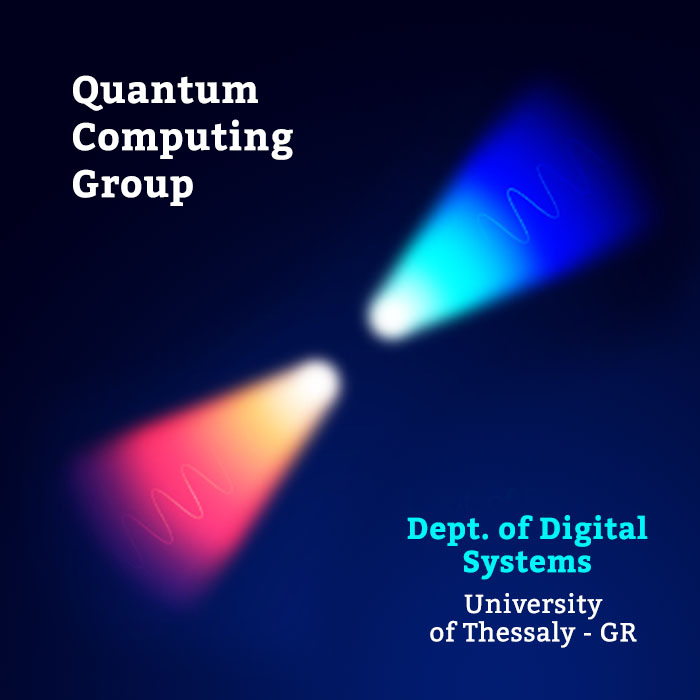QCCF 2022
Quantum Computing: Current state and Future trends
Special Session organized within
the 26th Panhellenic Conference on Informatics (PCI 2022)
November 25th to 27th, 2022
Special Session Organizer and Chair:
Ilias K. Savvas, Dept. of Digital Systems, University of Thessaly, Larissa, Greece

PCI 2022 will be a hybrid conference. The ability to present a paper and/or attend the conference both physically and remotely will be provided. In case on-site presence is not allowed by the State for epidemiological reasons, the conference will be only held online.

Description
Quantum computers take advantage of phenomena and properties of quantum mechanics such as superposition and quantum entanglement to perform calculations. When Quantum Computing Devices with a large number of qubits become reliable, our world will be shaken. From cryptography to chemistry, from pharmacology to machine learning and almost all scientific fields will flourish. Vaccines and drugs that took years to be discovered, with Quantum Computers will take months or days! Cryptography and current cryptographic algorithms will have no power! Codes would break in seconds when it would take centuries with classic computers. In addition, industries like Chemical, Healthcare and Drug Development, Security, and so on will take advantage of the new Computing Era. Therefore, new meta-quantum algorithms will have to be devised as we move into the era of Quantum Computing. However, the problem of the reliability of such computers still remains, especially when the number of qubits and the size of the circuit increases.
Today, colossal IT companies such as IBM, Google, Microsoft, Intel, Amazon (mentioning only a few of them) but also large and well-respected universities and research centers are investing huge sums of money in research to create reliable Quantum Computers.
In this special track, research works as well as practical applications are of interest. Authors from universities, research centers, and independent researchers are welcome to contribute. We seek original and high-quality submissions on, but not limited to, one or more of the following topics:
Topics
- Quantum Computing Research and Applications in Chemistry and Material Science, Blockchain and Cybersecurity, Logistics, Healthcare, Agriculture, and so on
- Quantum Machine Learning (algorithms, applications, and techniques)
- Quantum Processing Units (QPUs) and error correction
- Quantum Drug Development
- Parallel computations on Quantum Computing Devices
- Algorithms and Quantum computing in the NISQ (Noisy Intermediate-Scale Quantum) era
- Quantum cryptography
- Quantum Annealing and adiabatic quantum computing
- Quantum Internet
- Future trends of Quantum Computing
QCCF 2022 Programm Committee
- Maria A. Butakova, Smart Materials Research Institute, Southern Federal University, Rostov-on-Don, Russia
 Andrey V. Chernov, Smart Materials Research Institute, Southern Federal University, Rostov-on-Don, Russia
Andrey V. Chernov, Smart Materials Research Institute, Southern Federal University, Rostov-on-Don, Russia
С прискорбием сообщаем, что в субботу, 15 октября, на 52 году жизни скоропостижно скончался профессор Андрей Владимирович Чернов. Мы выражаем наши глубокие и искренние соболезнования его семье, родным и близким. Коллеги и ученики навсегда запомнят его, как доброго и отзывчивого человека, настоящего профессионала своего дела.
We regret to inform you that on Saturday, October 15, Professor Andrey Vladimirovich Chernov died suddenly at the age of 52. We express our deep and sincere condolences to his family, relatives, and friends. Colleagues and students will forever remember him as a kind and sympathetic person, a true professional in his field.
- Sergey M. Gushanskiy, Institute of Computer Technologies and Information Security, Southern Federal University, Rostov-on-Don, Russia
- Viktor S. Potapov, Institute of Computer Technology and Information Security, Southern Federal University, Rostov-on-Don, Russia
- Ioannis Theodonis, School of Applied Mathematical and Physical Sciences, National Technical University of Athens, Greece
- Costas Chaikalis, Dept. of Digital Systems, University of Thessaly, Greece
- Georgia Garani, Dept. of Digital Systems, University of Thessaly, Greece
- George Kakarontzas, Dept. of Digital Systems, University of Thessaly, Greece
- Omiros Iatellis, Dept. of Digital Systems, University of Thessaly, Greece
- Fotios Kokkoras, Dept. of Digital Systems, University of Thessaly, Greece
- Apostolos Xenakis, Dept. of Digital Systems, University of Thessaly, Greece
- Maria Avramouli, Dept. of Digital Systems, University of Thessaly, Greece
- Ilias Galanis, Dept. of Digital Systems, University of Thessaly, Greece
- Maria Sabani, Dept. of Digital Systems, University of Thessaly, Greece
Publication – Paper formatting – Submission
Proceedings of previous versions of PCI were published by ACM, in the International Conference Proceedings Series. The application procedure for this year’s edition has commenced.
Papers should be at most 6 pages in length. QCCF papers must be submitted to the EasyChair submission platform following the same submission and formatting guidelines as all other PCI 2022 submissions. Please, make sure to select the category “Quantum Computing: Current state and future trends”.
Please, check the details regarding paper templates and formatting. Note that the “manuscript” option should be used for papers prepared with the LaTeX Master Article Template.
PCI 2022 Important Dates
- Paper Submission Main Track:
Sep 4th, 2022Oct 13, 2022 (FINAL DEADLINE) - Paper Submission Special Sessions:
Sep 11th, 2022Oct 13, 2022 (FINAL DEADLINE) - Notification of Decision:
Oct 21st, 2021November 3rd, 2022 - Camera-Ready Papers: Nov 6th, 2022
Registration & Fees
Information regarding PCI 2022 Registration & Fees.
